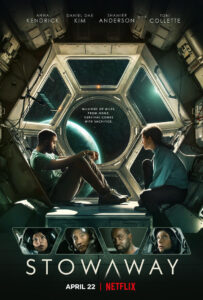 Should one person die so that three may live? That is the premise behind the Netflix movie, Stowaway starring Anna Kendrick, Daniel Dae Kim, Shamier Anderson, and Toni Collette. Anderson plays Michael Adams, a ground crew engineer who somehow is accidentally left on a spacecraft when it launches onto a two-year mission to and from Mars. His unexpected presence causes a great deal of difficulty for the three-person crew when equipment that provides their safety margin fails, and they realize that the presence of a fourth passenger will kill everyone.
Should one person die so that three may live? That is the premise behind the Netflix movie, Stowaway starring Anna Kendrick, Daniel Dae Kim, Shamier Anderson, and Toni Collette. Anderson plays Michael Adams, a ground crew engineer who somehow is accidentally left on a spacecraft when it launches onto a two-year mission to and from Mars. His unexpected presence causes a great deal of difficulty for the three-person crew when equipment that provides their safety margin fails, and they realize that the presence of a fourth passenger will kill everyone.
Stowaway is a story built around the ethical questions presented with the Trolley Problem or the Lifeboat Dilemma. It delves deep into the emotional response of each of the movie’s characters to this forced no-win scenario. It doesn’t set out to answer either question because it takes the viewer on the journey as the characters find their own answers.
Eve and I are joined this month by special guest Blair Allen. Blair is one of the hosts of the official NASA EDGE video podcast, an adjunct professor at Regent University’s School of Communication and the Arts, and a ruling elder in the Presbyterian Church of America. Blair was kind enough to join us and provide his unique perspective as a man of faith heavily involved with the culture of space exploration.
Joe Penna directs Stowaway with music composed by Volker Bertelmann—a newcomer to the Are You Just Watching podcast. The movie is a departure from our normal fare in several different ways. The director and composer use the music as a sort of stand-in for the almost frenetic pace that we see in many of the movies we’ve reviewed. The story of Stowaway is much more of a long, slow burn than it is an “action-rest-action” presentation, and the music helps set a substitute cycle through “tension-relax-tension” type of pace.

Please note: Because of how the movie progresses, we will not avoid discussing spoilers. If you don’t want to know how the movie ends, please enjoy the movie before continuing.
First Impressions
Stowaway does a good job of framing the story that they set out to tell. The film’s events are from launch to one or two days out, even though the mission is two years or more. The story is reminiscent of the novel Oxygen by John B. Olson and Randall S. Ingermanson, which is the same ethical question, except from the pen of a professing Christian author.
Stowaway is a movie that succeeds despite Kendrick’s performance rather than because of it. Anna Kendrick’s acting chops are more hindrance than a help, and this role is not one that she could use to break out of the same general character that she has played before. Actually, her characters have been different, but her line delivery doesn’t seem to change. Because of that lack of range, it was a distraction to both Eve and me. Daniel Dae Kim does a much better job of making his own role, using his lines and facial expressions to tell half or more of his story. Blair pointed out that, in real space travel, originality and individuality are usually antithetical to mission—success depends on everyone performing exactly as expected, following strict procedures and processes. It appears that the creative team was trying to strike a balance between establishing emotional weight and authenticity. For my part, there were times where the emotional angst was too heavily emphasized on the commander—someone I felt should have been far less emotional.
The writers and directors of Stowaway did a decent job of balancing the science of space travel with the story they wanted to tell. Science consultant Scott Manley tells how the consultants would identify potential solutions to the issues that arise during the movie and the script writers would change the story and circumstances to make those potential solutions unavailable. First and foremost, there is the story, and everything else was bent to serve the story. I can respect that. Still, it can affect each viewer’s enjoyment and is dependent on the suspension of disbelief.
Another interesting and effective choice was that nearly all the audio you hear during Stowaway is those of the crew (and the stowaway). They accomplished two things in our minds with this choice. First, it really emphasizes the isolation that the crew feels. They have departed on a two-year journey to Mars, and there is no turning back. In the sense of taking action, they are completely on their own. Second, it really helps to put the audience in the position of stowaways themselves. They are outside, looking in, deprived of any information that does not come from the other crew members.
For me, the entire story element revolving around the algae was a speed hump on the road to belief. The all-or-nothing attempt at using the algae to offset the oxygen deficiency seems disingenuous to the movie’s science. Of all the science hedging, this seems the most egregious because it seems the most false. Additionally, Kim’s hostility and frustration over sacrificing two or three years of research and work to try and save someone’s life seems hollow as well. It is literally a life and death scenario. It doesn’t seem like a real person would be fretting over this kind of thing.
The Trolley Problem and Lifeboat Dilemma
As discussed above, the premise of the lifeboat and trolley problems is centered around the value of life. In both cases, the question came down to this: is it ethical to intentionally kill one person to certainly save the lives of multiple people? In the Trolley problem, it’s a question of two tracks for a runaway trolley car—the one the trolley is on that will kill five people, or the one YOU can switch the trolley to that will kill one person. How might a child address this question?
In the lifeboat scenario (which actually happened), the question becomes, is it ethical to kill and eat one man to save the lives of others stranded on a lifeboat?
These ethical thought experiments have come back to the forefront of technology now as autonomous vehicles become more mainstream. How will the artificial intelligence that operates these vehicles address such ethical situations? The weight of this problem is multiplied by the choice to not make this a NASA mission (who always “brings them home, no matter what”) but a fictional private space agency, Hyperion. Throughout the movie, they drop hints on how Hyperion has cut corners to make the mission happen, corners that NASA would never, ever have even considered.
The point of Are You Just Watching is to examine this from a biblical perspective, though. As Christians, we know for certain that death is not the end, just the transition to eternity. This knowledge has to inform our decisions in such ethical dilemmas. Humanity’s fallen position makes us, apart from the Holy Spirit, unqualified to answer this question adequately. Only God has the power to do so. Even more disturbing there are those who feel that they have the right and authority to make such decisions on behalf of others—with or without their consent. It all ties back to the fall when Satan challenges Eve to start questioning why she cannot be like God:
“No! You will certainly not die,” the serpent said to the woman. “In fact, God knows that when you eat it your eyes will be opened and you will be like God, knowing good and evil.” (Genesis 3:4-5)
In Luke 8:40-56, we see where Jesus, by the nature of the situation, has to make a similar ethical choice, but his faith is such that he does not worry because he knows it is all in God’s hands. For more on this, see this blog post on the topic.
This helps to remind us that we need to focus on the eternal perspective rather than the mortal perspective as Christians. We see this in the climax of Stowaway, when Zoe chooses to sacrifice herself to save the lives of her crew mates as well as the stowaway, Michael. If we were in the same position, we should hope that we are willing to do the same, if only to allow those unsaved to come to know Christ. When Zoe made the call to give up her own life, she based her decision, at least in part, on the fact that she had no one on earth to come back to. Her decision is also one of redemption as the sacrifice allows her to make up for a failure that would allow them to save at least 3 of the four passengers.
“Give my life meaning beyond anything I could imagine.”
Shortly after launch, the three crew members participated in an interview to ask why they signed up for this mission. Zoe summed up her answer, “[To] give my life meaning beyond anything I could imagine.” In the meaning she ends up finding through her sacrifice, we see a clear connection to Christ’s command:
This is my command: Love one another as I have loved you. No one has greater love than this: to lay down his life for his friends. (John 15:12-13)
Zoe’s meaning is found in this ultimate expression of love. Indeed, her position of being the flight surgeon can be a source for this instinct as well. If she subscribes wholeheartedly to the Hippocratic Oath, she may have seen this course of action as the only possible one where she can abide by her oath. As scripture tells us, perhaps it is through a sacrifice like this that Zoe could actually find her life.
Anyone who finds his life will lose it, and anyone who loses his life because of me will find it. (Matthew 10:39)
In Stowaway, Zoe and David’s character traits could be said to be dependent on hope. Zoe has it; David doesn’t seem to. Zoe doesn’t know where her hope comes from, but she has faith, and through her faith, it is there. David is really much more of a fatalist.
The Sanctity of Human Life
At the core of these ethical questions is how we value human lives. The Hyperion decision in Stowaway seems to be that Michael’s life is somehow less valuable than those of the people who are supposed to be on the mission. As Christians, we have to acknowledge that all lives are invaluable. Without understanding the image of God, we begin to think of other’s lives as commodities and forget that all are of God, as we see in Amos 2:6-16.
This is balanced against God’s absolute sovereignty regarding who lives and who dies. In Genesis 6-8, we see where God sets only Noah and his family aside to be saved from the flood. We also see it in 1 Samuel:
Now go and attack the Amalekites and completely destroy everything they have. Do not spare them. Kill men and women, infants and nursing babies, oxen and sheep, camels and donkeys.’” (1 Samuel 15:3)
God is, quite simply, beyond our understanding, as shown in Job 38.
But God has given us some insight. In his laws to the newly formed nation of Israel, God reminds us that we are still valuable.
When men get in a fight and hit a pregnant woman so that her children are born prematurely but there is no injury, the one who hit her must be fined as the woman’s husband demands from him, and he must pay according to judicial assessment. If there is an injury, then you must give life for life, eye for eye, tooth for tooth, hand for hand, foot for foot, burn for burn, bruise for bruise, wound for wound. (Exodus 21:22-25)
Since we are not God, we should be valuing life in every way we can yet honor God in our decisions. The best way we can do this is by knowing and living His word. We do this through study, mediation, and prayer. Not sometimes, but frequently. If we can entrench ourselves in the Word of God, we can be sure that we are serving the Will of God.
Further Discussion?
There are many more topics from Stowaway that warranted discussion, but we only have so much time. For example, how might Hyperion’s decisions regarding mission version life reflect our instructions to stewardship of God’s creation? How well did commander Barnett handle the burden of command? What could she have done differently? You can discuss all this and more in our Facebook group!
Please support the podcast!

Are You Just Watching? is listener supported. Special thanks to our current patrons: Isaias Santillano, Craig Hardee, Stephen Brown II, David Lefton, and Peter Chapman for their generous support. We can't continue to share critical thinking for the entertained Christian without your financial help, so please head on over to our Patreon page and become one of our supporting patrons!
Share your feedback!
What did you think of Stowaway? We would like to know, even if just your reactions to the trailer or the topics we shared in this episode. Or what general critical-thinking and entertainment thoughts or questions do you have? Would you like to suggest a movie or TV show for us to give a Christian movie review with critical thinking?
- Comment on the shownotes
- Call (513) 818-2959 to leave a voicemail
- Email feedback@AreYouJustWatching.com (audio files welcome)
- Join our Facebook discussion group.
Please connect with us
- Join our Discord community where you can connect with us and our listeners directly!
- Subscribe, rate, and review on Apple Podcasts
